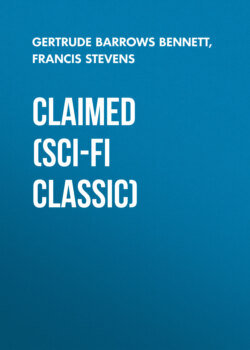Читать книгу Claimed (Sci-Fi Classic) - Francis Stevens - Страница 3
Preface
ОглавлениеExtract from entry of May 17, 19-, in the log of the Portsmouth Bell, British merchant vessel, Captain Charles Jessamy, Master:
The floating scoria and ashes covering the sea in an almost unbroken thickness of from six to fifteen inches are greatly impeding our progress. How far we shall have to sail before we are out of the affected region I am unable to judge. With the fair breeze and all canvas set, three knots has been our best speed since meeting the seismic wave, May 14.
The port binnacle still disagrees by two and a quarter points with the starboard binnacle, and by one and a half with that in my cabin. Two of the compasses, therefore, or more likely, all three, have been in some manner affected by the submarine volcanic convulsion which caused the wave. Heavy clouds preclude observations; by dead reckoning we should have sighted Corvo early this morning. The heat is terrible, registering 150 F. in the coolest parts of the ship.
Approaching at last the island referred to on my last entry of the 16th, I determined to go ashore if possible. Shortly after six bells in the afternoon watch, being then by dead reckoning 40 degrees N., 31 degrees 15 minutes W., we dropped in a boat, and, leaving Mr. Kersage in charge of the ship, with considerable difficulty made our way to land. The island proved to be perhaps five miles in circumference, being of an irregular, oval shape. The formation is a dark, chocolate-colored rock, striated with metallic-red, as I discovered by scraping away at one spot the scoria and wet ashes with which it is thickly coated.
Near the center the rock has been flung up in ridges, forming rectangular and other shapes, quaintly reminiscent of the ruins of old buildings. Though, from some distance off, I observed that in several cases the warm rain which has been falling intermittently had washed the ash away from these ridges and that the rock so bared is uniformly of the same brilliant metallic-red with which the chocolate-colored formation near the shore is streaked.
From where we stood the illusion of ruins was nearly perfect, and indeed — who knows? — we may to-day have looked upon the last surviving trace of some ancient city, flung up from the abyss that engulfed it ages before the brief history we have of the race of man began. I would have liked to investigate the “ruins” more closely, but thought best not to attempt it. From many fissures hot, ill-smelling, and probably poisonous vapor is still pouring up, and though the rock is sufficiently cool so that it is possible to walk on it, I deemed it safer to confine exploration to a comparatively small space near our landing-place.
I and one of the men, James Blair, were the sole members of my little exploration party actually to set foot where man has at least not set foot in untold ages, and where, in all possibility, man may never set foot again, since land of this type is quite likely to sink beneath the waves as abruptly as it rose above them.
Blair rather amused me by asking permission to carry away a keepsake of Belle Island as Kersae and I agreed to name it. Scattered over its surface are many irregular blocks and ball-shaped masses — “bombs” as they are termed — greenish-black lava. One of the smaller of the blocks was rather pretty, having a very regular rectangular shape, and the lava deep-green in color, flecked with brilliant scales of metallic scarlet.
Blair said he meant to cut and hollow it out as a box, but when he picked it up it was so hot it burned his hands. The men who had remained in the boat, laughed, which so much annoyed Blair that he removed his shirt, wrapped the block in that, and triumphantly carried it off.
A memento of Belle Island! As I write the place is still visible, a black streak flecked with the scarlet of its “ruins,” and set in a desolate, heaving waste of gray. I wonder if any other ship will ever sight that land? It may rise yet higher, pushed up by the mighty forces at work beneath us. Or it may be only a week — a day — till the sea reclaims its own.
